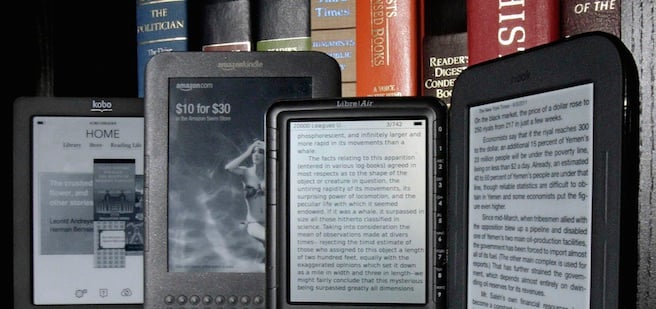The coming ebook boom
With prices of e-readers and content coming down fast, they might soon make up the majority of book sales
The Kobo eReader Touch, an Amazon Kindle, an Aluratek Libre Air, and a Barnes & Noble Nook, left to right, are displayed in this photo, in New York, Tuesday, June 14, 2011. When the Kindle was new, in 2007, it cost $399. Now, e-book readers, including a Kindle, can be had for just north of $100. (AP Photo/Richard Drew)
Share

If you thought ebooks were growing quickly, then you—as the saying goes—ain’t seen nothing yet. A confluence of factors set in motion last week are likely to push ebook sales from explosive to exponential.
First up there was the Department of Justice’s settlement with Hachette, HarperCollins and Simon & Schuster, wherein the three publishers were found to have participated in “a conspiracy to raise, fix, and stabilize the retail price for newly-released and bestselling trade e-books, to end retail price competition among trade e-books retailers, and to limit retail price competition.”
A judge last week approved the settlement, which will prevent the three publishers from agreeing to any sort of contract with an e-book retailer that lets them set prices for two years. The companies will also not be allowed to enter into “most-favoured nation” deals, which guarantee a certain retailer the best price on their goods, for five years.
Apple and two publishers, Penguin and Macmillan, are holding out and saying that their “agency pricing” deal was designed to counter Amazon’s growing power and therefore make the ebook market more competitive, not less. The fight will continue, but ebooks from the three publishers who settled are expected to take a nose dive. A return to Amazon’s $9.99 price point is a veritable certainty, while the fact that ebook prices rose in general once Apple entered the market seems like a pretty damning fact in general.
On another front, Amazon also unveiled a host of new e-readers/tablets for several markets last week. The company will soon start selling several versions of the Kindle Fire HD tablet, ranging from $199 for the seven-inch version to $499 for an 8.9-inch model with LTE wireless connectivity. The Kindle Paperwhite e-reader, meanwhile, features an e-ink screen that closely resembles paper and sells for $119, with a 3G version going for $179. The plain, old, basic Kindle, meanwhile, will cost only $69.
Yup, an e-reader will now cost about the same as two hardcover books. If these upgraded, cheaper devices don’t spur even more consumers in the U.S., U.K. and several European countries to snap up e-readers and tablets, nothing will.
Of course, the obvious question is: what about the rest of us living outside the U.S.?
Amazon has been shipping the basic versions of Kindle into Canada for years now, but the original Fire tablet—which is tied heavily to the company’s movie- and music-selling businesses—has not yet been made available, presumably because of the hassles involving licensing rights. As such, the company’s efforts in Canada and other countries have been half-hearted at best.
Others have slipped in to fill the void. In Canada, the alternative has been Kobo, which until recently was majority owned by Indigo Books and Music. Before selling to Japan’s Rakuten last year, Toronto-based Kobo managed to become the market leader in e-readers in Canada, as well as France, and establish a presence in several other countries.
Not to be outdone, Kobo last week also introduce a similar new lineup of tablets and e-readers. The Arc tablet, on sale in November, will run Google’s Android operating system and cost $199 and $249 depending on version, while the Glo e-reader will cost $129 starting Oct. 1. The Mini will go on sale at the same time and cost only $79.
Company observers have long been expecting Apple to release a cheaper seven-inch iPad to compete with the likes of the popular Kindle Fire, so this may be an opportunity to do so.
It’s obvious that prices on both e-readers and e-books are heading down. E-book sales surpassed hardcovers this year. With continually lower prices on both hardware and content, they’ll soon make up the majority of overall book sales too.